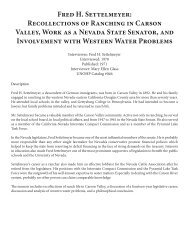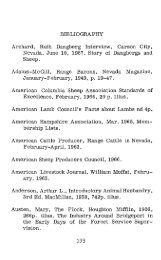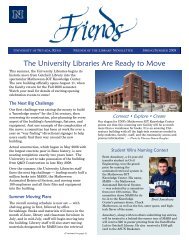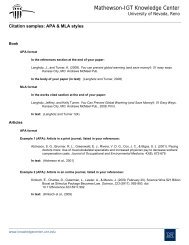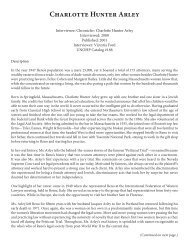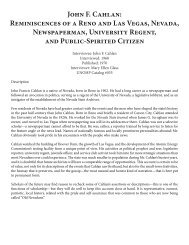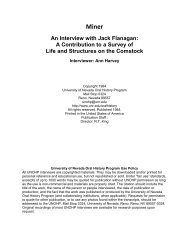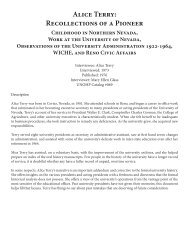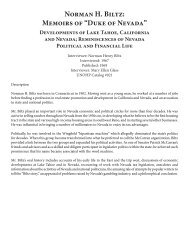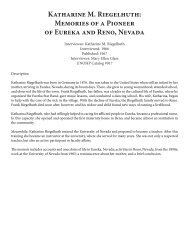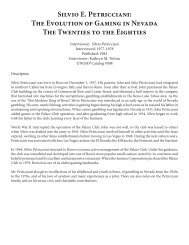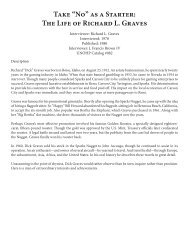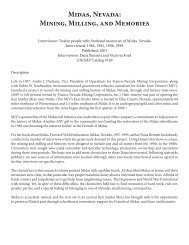Warren Nelson - University of Nevada, Reno
Warren Nelson - University of Nevada, Reno
Warren Nelson - University of Nevada, Reno
Create successful ePaper yourself
Turn your PDF publications into a flip-book with our unique Google optimized e-Paper software.
This was something that was very<br />
interesting. Having been around people as<br />
much as I had in the gambling business it was<br />
easy for me to talk to these young fellows and<br />
draw them out. I was very interested in the<br />
testing end <strong>of</strong> it.<br />
I interviewed people well, and the main<br />
thing they started to do was having me<br />
conduct these tests. My voice was always<br />
good and strong, so I was able to test a good<br />
many people at one time giving these tests at<br />
diff erent locations. Actually, I became sort <strong>of</strong><br />
the chief tester and gave 10 tests to as many as<br />
twenty thousand Marines at one time. Th at’s<br />
how fast we were turning them out.<br />
We started out in San Diego and later<br />
got split up into two groups, and I traveled<br />
the Eleventh, Twelft h, and Th irteenth Naval<br />
Districts for almost two years just catching<br />
up with the people in the Marine Corps that<br />
hadn’t had these classifi cation tests or hadn’t<br />
been classifi ed.<br />
Captain Presley was a very good man, a<br />
very nice man and helped me along a lot. He<br />
was sent overseas and that was my object too.<br />
I told him to be sure and send for me; he said<br />
he would. When he got over there he wrote<br />
back to me and told me there was no reason<br />
for me to go overseas because I could do a<br />
better job in the states and for me to stay there.<br />
I think that two weeks aft er I got out <strong>of</strong><br />
boot camp, I made corporal; two weeks later<br />
I made sergeant, and a month later I made<br />
staff sergeant. And that’s probably as fast a rise<br />
you’d ever see in the service. However, it was<br />
in wartime and they needed the help very bad.<br />
I stayed a staff sergeant for eighteen months<br />
and then went to tech sergeant.<br />
I spent four years in the Marine Corps, all<br />
<strong>of</strong> it in personnel classifi cation, moved around<br />
a great deal and wound up in the Department<br />
<strong>of</strong> Pacifi c in San Francisco. I transferred a<br />
hundred and twenty-nine times, and my<br />
Military Service, 1942-1946<br />
23<br />
papers showing my transfers in the Marine<br />
Corps had to be higher than my head when<br />
they were stacked up. When I fi nally got sent<br />
into San Francisco, I had traveled from Seattle<br />
down to San Diego as far east as Denver and<br />
all over the Pacifi c northwest and southwest,<br />
as far as that’s concerned. We traveled in a<br />
group and fi nally we went to every place they<br />
had a Marine station, and this included the<br />
recruiting <strong>of</strong>fi ces in each little town. Had the<br />
opportunity to go back into Butte, Montana,<br />
and Great Falls, Montana, my home town,<br />
to interview the people there and give them<br />
the tests that had to be given. It was a pretty<br />
satisfying job because you were able in some<br />
ways to help people do what they really<br />
wanted to do in the Marine Corps which had<br />
never happened before.<br />
I fi nally got sent to San Francisco, and we<br />
were stationed at Oak Knoll Hospital. I was<br />
there for quite awhile with a group handling<br />
people that came back from overseas. It was<br />
a pretty depressing thing because you’d get<br />
men come back that had their legs shot <strong>of</strong>f<br />
and arms shot <strong>of</strong>f ; they had to be tested and<br />
all. And most <strong>of</strong> them were pretty pitiful. It<br />
was a job that was real hard to do because <strong>of</strong><br />
the people you had to handle. We also went<br />
through all the Marine Corps prisons and did<br />
those people, and that was very depressing<br />
too. However, the good part <strong>of</strong> it was that you<br />
were able to help a lot <strong>of</strong> young people and<br />
send them aft er they came back from overseas<br />
and send them close to their home towns<br />
where they wanted to go. So it compensated<br />
for the depressing part <strong>of</strong> it, compensated by<br />
the good things you could do. I became very<br />
interested in this type <strong>of</strong> work and thought I<br />
was really fi tted for it.<br />
I was transferred to San Francisco and<br />
got a new commanding <strong>of</strong>ficer. I became<br />
very well acquainted with him; his name was<br />
Bernard J. Alpers; he was also a captain. He



